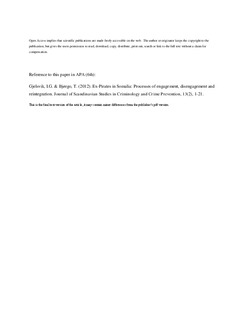| dc.contributor.author | Gjelsvik, Ingvild Magnæs | |
| dc.contributor.author | Bjørgo, Tore | |
| dc.date.accessioned | 2012-11-07T11:23:41Z | |
| dc.date.available | 2012-11-07T11:23:41Z | |
| dc.date.issued | 2012 | |
| dc.identifier.issn | 1404-3858 | |
| dc.identifier.uri | http://hdl.handle.net/11250/174662 | |
| dc.description | This is the final text version of the article, it may contain minor differences from the publisher’s pdf version. | no_NO |
| dc.description.abstract | During the last decade piracy outside the Somali coast has become an increasing problem – not only for international shipping companies but also for many affected local communities in Somalia. This study will address how and why individuals in Somalia get involved in piracy activities, and how and why some of these individuals eventually disengage from these criminal groups and activities. Based on qualitative interviews with 16 ex-pirates and pirate associates and a number of other locals and experts, the study provides first-hand insights into some of the conditions, circumstances and processes which may serve to discourage involvement and continued engagement in piracy. It will also analyze factors and circumstances which may encourage and facilitate disengagement from these criminal activities and reintegration into non-criminal economic activities and social relationships. A question of interest is whether the decisions to join and leave a piracy group are made by the individuals alone or are influenced by others, such as family members and peers. The roles of moral authorities like religious leaders and parents are also a core issue. The chaotic political and economic situation in Somalia provides the context for the choices individuals make in relation to piracy. However, the focus of this study is on micro and meso (individual and group) level processes rather than on macro level factors, which have been covered well by other researchers.
The article also looks at the Norwegian Church Aid’s “Alternative Livelihood to Piracy” (ALP) project. This is not an evaluation of the ALP project as such. This study will rather analyse to what extent the project is facilitating the disengagement of individuals from piracy groups and their eventual reintegration into productive non-criminal livelihood in the Somali context. | no_NO |
| dc.language.iso | eng | no_NO |
| dc.publisher | Taylor & Francis | no_NO |
| dc.subject | crime prevention | no_NO |
| dc.subject | piracy | no_NO |
| dc.subject | Somalia | no_NO |
| dc.subject | reintegration | no_NO |
| dc.subject | disillusionment | no_NO |
| dc.subject | religious leaders | no_NO |
| dc.subject | islamic moral values | no_NO |
| dc.subject | social networks | no_NO |
| dc.subject | kriminalitetsforebygging | no_NO |
| dc.subject | piratvirksomhet | no_NO |
| dc.subject | reintegrering | no_NO |
| dc.subject | desillusjonering | no_NO |
| dc.subject | religiøse ledere | no_NO |
| dc.subject | islamske moralverdier | no_NO |
| dc.subject | sosialt nettverk | no_NO |
| dc.title | Ex-Pirates in Somalia : processes of engagement, disengagement and reintegration | no_NO |
| dc.type | Journal article | no_NO |
| dc.type | Peer reviewed | no_NO |
| dc.source.volume | 13 | no_NO |
| dc.source.journal | Journal of Scandinavian Studies in Criminology and Crime Prevention | no_NO |
| dc.source.issue | 2 | no_NO |
